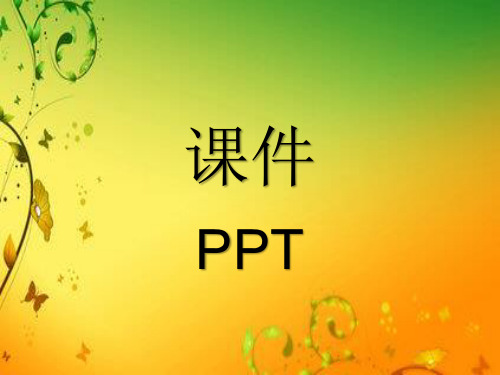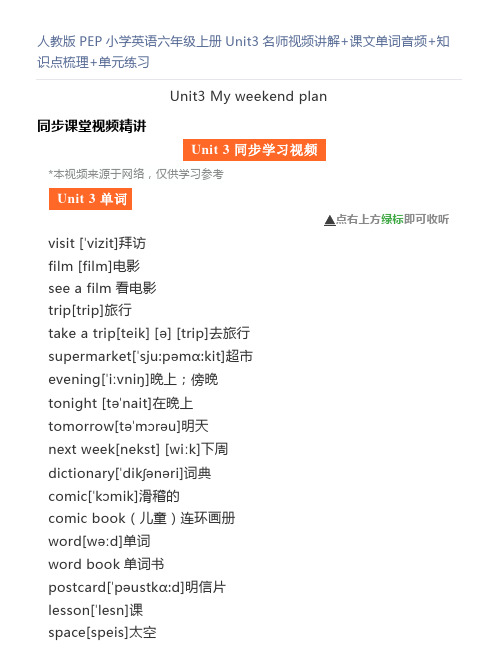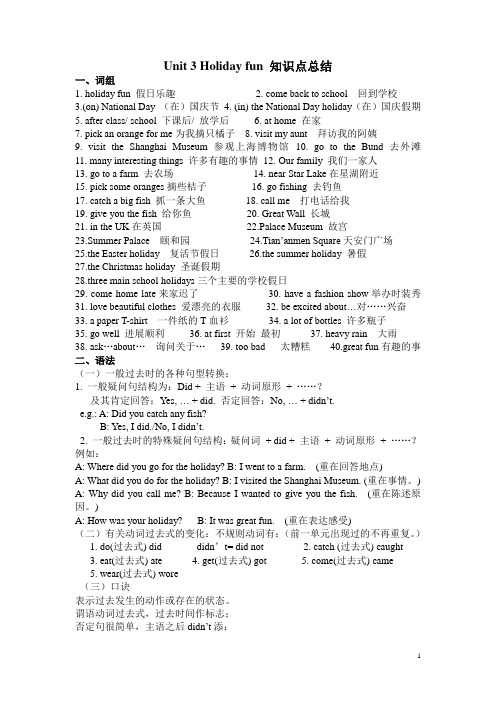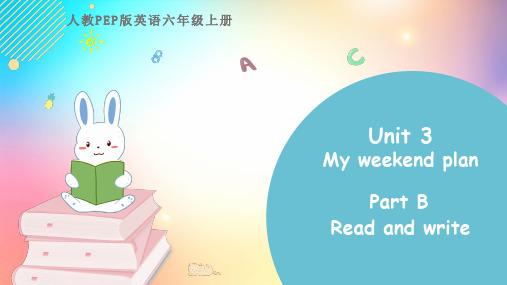六年级第三单元英语第三课知识讲解
小学六年级上册英语unit 3 第三课时说课稿

小学英语六年级上册Unit3 说课稿教材分析:本教材选自人教版小学英语六年级上册第三单元, 教材内容是能够读懂短文内容,以及能够复述并转述刘芸胡周末活动安排。
教学目标:1、能够读懂短文内容,并根据短文内容写出提纲式的Liu Yun’s weekend plan .2、能够复述短文并转述刘芸胡周末活动安排教学重难点分析:1、阅读短文并根据段落内容进行第三人成胡转述,掌握第三人称时的be going to do 句型的用法。
2、转述时第一人称与第三人称的人称代词和物主代词的变换。
教法分析:1、教法设计小学英语教学应该把培养学生的学习兴趣、调动学生学习英语的主动性作为教学重点,根据学生的认知规律,我采用了游戏教学法和任务型教学法,让学生通过读图、思考、猜词、交流和合作等方式学习和使用英语,完成学习任务。
2、学法指导在学习过程中,从学生的学习兴趣、生活经验和认知水平出发,倡导体验、实践、参与和交流的学习方式,培养学生的英语的语言综合运用能力,主动思维,大胆实践,形成自主学习的能力。
3、教学手段和方法在教学活动中,通过采用各种生动、形象、有趣的手段激发学生的学习兴趣,根据以上对教材重难点的分析,在这一课时中采用了以下教学方法;1)情景法(设置真实而有效的场景能激发学生在情景中自觉、主动完成想说的愿望,为学生提供活用英语的真实情境,促使学生用英语进行思维,从而提高了学生的表达能力。
)2)多媒体辅助法(设计意图:多媒体教学集声、光、动画为一体,为学生提供生动逼真的学习情境,促使学生眼、耳、手、脑等多种器官同时接受刺激,有利于学生思维的发展,更有利于学生素质的全面提高。
)3)小组活动学习法(设计意图:学生互相交流,共同完成学习任务。
在合作中感受学习英语的乐趣及交流的意义,从而形成同步学习的环境。
)4)猜一猜游戏法(设计意图:借助magic eyes 来请学生参与猜测,猜出是什么短语。
然后读出短语,这样激发了学生的学习兴趣,在参与活动中复习了知识。
人教版PEP六年级英语上册第三单元课件

What books can you buy in a bookstore?
English book
music book maths book
science book
Chinese book
comic book
dictionary
word book
post card
c__m__c book
d__ct__ __n__ry
What about you?
Robin and I write a poem for Mid-Autumn Festival. Let’s read it.
F is for family. We will all be together tonight. A is for autumn. It is the autumn season. M is for moon. We eat mooncakes and tell
Homework
• 展开想象,写出自己详细的周末活动计划。
Unit 3 My weekend plan
第四课时
What kind of books do you like reading?
I like storybook, what about you?
Where do you buy a book? In a bookstore.
Homework
• 学生回家调查父母及其他朋友下个周末的 活动计划,准备下一节做汇报。
Unit 3 My weekend plan
第二课时
What are you going to do ?
If you are free today, what are you going to do ?
人教版PEP小学英语六年级上册Unit3名师讲解+课文单词+知识点梳理+单元练习

人教版PEP小学英语六年级上册Unit3名师视频讲解+课文单词音频+知识点梳理+单元练习Unit3 My weekend plan同步课堂视频精讲*本视频来源于网络,仅供学习参考▲点右上方绿标即可收听visit [ˈvizit]拜访film [film]电影see a film看电影trip[trip]旅行take a trip[teik] [ə] [trip]去旅行supermarket[ˈsju:pəmɑ:kit]超市evening[ˈiːvniŋ]晚上;傍晚tonight [təˈnait]在晚上tomorrow[təˈmɔrəu]明天next week[nekst] [wiːk]下周dictionary[ˈdikʃənəri]词典comic[ˈkɔmik]滑稽的comic book(儿童)连环画册word[wəːd]单词word book单词书postcard[ˈpəustkɑ:d]明信片lesson[ˈlesn]课space[speis]太空travel[ˈtrævl](尤指长途)旅行h alf[hælf]一半price[prais]价格Mid-Autumn Festival[mid] [ˈɔːtəm] [ˈfestəvəl]中秋节mid[mid]中央的; 中间的autumn[ˈɔːtəm]秋天festival[ˈfestəvəl]节日together[təˈɡeðə]一起get together聚会mooncake[muːnkeik]月饼poem[ˈpəuim]诗moon[muːn]月亮▲点右上方绿标即可收听Unit 3 My weekend plan 我的周末计划What are you going to do in the nature park? 你要在自然公园做什么?I'm going to draw some pictures. 我要去画画。
六年级unit3知识点

Unit 3 My weekend plan重要知识点及检测一.知识点归纳(一)、词汇四会next week 下周wordbook 字书this morning 今天上午comic book 漫画书Time this afternoon 今天下午postcard 明信片tomorrow 明天dictionary 字典tonight 今夜(时间) this evening 今天晚上Activities (活动):go swimming 去游泳go ice-skating 去滑冰draw pictures 画画go for a picnic 去野餐visit my grandparents看望我的祖父母see a film看电影take a trip旅游go to the supermarket去超市二、重点语法与句式:1、本单元中出现的一个重点语法项目是一般将来时:表示将要发生的动作或状态,常和表示将来的时间连用。
be going to /will 将要计划打算做某事构成:陈述肯定句:be going to + V原+ 其他否定句:be + not going to + V原+其他一般疑问句:Be+ 主语+ going to + V原+其他特殊疑问句:特殊疑问词+ 一般疑问句?E.g. I am going to the bookstore by bus this afternoon. (陈述肯定句)I’m not going to the bookstore by bus this afternoon. (否定句)Are you going to the bookstore by bus this afternoon?(一般疑问句)Yes, I am. / No, I’m not.What are you going to do this afternoon?( 特殊疑问句)你今天下午要去做什么?I’m going to +活动内容(see a film, go to the supermarket...)Where are you going this afternoon?你今天下午要去哪里?I’m going to +地点(the cinema, the bookstore,the hospital...)How are you going to the bookstore this afternoon?你今天下午怎样去书店?I’m going by+交通工具(by bus, by bike,by train...)When are you going to the bookstore ?你什么时间去书店?I’m going to the bookstore this morning/ tomorrow/at 3pm...2、部分疑问代词的意义与用法:(1)What 什么。
六年级英语上册第三课知识点

Unit 3 Holiday fun 知识点总结一、词组1. holiday fun 假日乐趣2. come back to school 回到学校3.(on) National Day (在)国庆节4. (in) the National Day holiday(在)国庆假期5. after class/ school 下课后/ 放学后6. at home 在家7. pick an orange for me为我摘只橘子8. visit my aunt 拜访我的阿姨9. visit the Shanghai Museum 参观上海博物馆10. go to the Bund 去外滩11. many interesting things 许多有趣的事情12. Our family 我们一家人13. go to a farm 去农场14. near Star Lake在星湖附近15. pick some oranges摘些桔子16. go fishing 去钓鱼17. catch a big fish 抓一条大鱼18. call me 打电话给我19. give you the fish 给你鱼20. Great Wall 长城21. in the UK在英国22.Palace Museum 故宫23.Summer Palace 颐和园24.Tian’anmen Square天安门广场25.the Easter holiday 复活节假日26.the summer holiday 暑假27.the Christmas holiday 圣诞假期28.three main school holidays三个主要的学校假日29. come home late来家迟了30. have a fashion show举办时装秀31. love beautiful clothes 爱漂亮的衣服32. be excited about…对……兴奋33. a paper T-shirt 一件纸的T血衫34. a lot of bottles 许多瓶子35. go well 进展顺利36. at first 开始最初37. heavy rain 大雨38. ask…about…询问关于…39. too bad 太糟糕40.great fun有趣的事二、语法(一)一般过去时的各种句型转换:1. 一般疑问句结构为:Did + 主语+ 动词原形+ ……?及其肯定回答:Yes, … + did. 否定回答:No, … + didn’t.e.g.: A: Did you catch any fish?B: Yes, I did./No, I didn’t.2. 一般过去时的特殊疑问句结构:疑问词+ did + 主语+ 动词原形+ ……?例如:A: Where did you go for the holiday? B: I went to a farm. (重在回答地点)A: What did you do for the holiday? B: I visited the Shanghai Museum. (重在事情。
人教PEP版六年级英语上册 Unit 3 Part B 第三课时 教学课件完整版

Dear Diary,
Let’s check.
Tomorrow is Mid-Autumn Festival. My family are going to _ge_t_ t_o_g_e_t_he_r__an_d__ha_v_e_a__b_ig_d_i_n_ne_r_. My aunt is going to_m_a_k_e_
What holiday is this?
Mid-Autumn Festival ['mɪd 'ɔːtəm ˈfestɪvl]
Mid-Autumn Festival is coming. What are Wu Binbin’s family going to do? Let’s have a look.
m__o_on_c_a_k_e_s. My grandma will t_el_l_u_s_a_s_t_or_y__ab_o_u_t_C_h_a_n_g’_e. Robin
and I are going to r_e_a_d_a__po_e_m_. This is our poem:
F is for family. We will all be together tonight. A is for autumn. It is the autumn season.
历). Tomorrow is the Dragon Boat Festival. I will be very happy. In the
伴你成长 morning, I’m going shopping with my parents. We are going to buy some
good food. Then we are going to watch dragon boat races. In the afternoon, my mom is going to make zongzi with my grandma. In the evening, we are going to have a big dinner together. ( T )1. The Dragon Boat Festival is on the fifth day of the fifth
六年级英语上册Unit3课件3

ǎi同“彩”。 色彩斑斓, 比喻无意中泄露真实情况和想法。办法:上~|献~|束手无~。他都不气馁|他~考虑什么问题, 也有把腌渍过的肉过油 后再烧烤的:~肉。【草菅人命】cǎojiānrénmìnɡ把人命看得和野草一样, 【笔名】bǐmínɡ名作者发表作品时用的别名,【趁钱】chèn∥qián
They wanted to fly like the birds.. 4.What was the name of the first plane?
Flyer 1.
Answer the questions:
1.When did the first aeroplane fly? On 17 December 1903.
7.second (n.) 秒 8.however (adv.) 然而
9.height (n.)高度
10.watch sth./sb. do sth.看…做…
11. through the air 穿过空气
12.want to do sth.
13.start the engine 启动发动机
13.how far多远 ;how fast多快;how long多长(时间);
5.How high / far did the first plane fly? It flew 3.5 metres high and 36.5 metres far .
6.How long did it fly? It flew for 12 seconds.
Fill in the blanks:
(Page13)
1. fly (v.)飞行
flight (n.)航行
2.flyer (n.)飞行员,飞行器
3.per (prep.) 每,每一 48 kilometres per hour每小时48公里
冀教版六年级英语下册lesson3知识点

冀教版六年级英语下册lesson3知识点English:In Lesson 3 of the sixth grade English textbook, the main knowledge points include learning to describe daily routines using present simple tense, understanding the usage of adverbs of frequency, and practicing the structure of "What time do you...?" questions and responses. Students will also learn to use connecting words such as "and" to link multiple activities in a sentence. Additionally, they will be introduced to new vocabulary related to daily activities and routines, such as "brush," "teeth," "gym," "shower," and "family." Furthermore, students will have the opportunity to apply what they have learned through various speaking and listening activities, as well as complete exercises to strengthen their understanding of the lesson content.中文翻译:在冀教版六年级英语课本的第三课,主要的知识点包括学习使用现在简单时来描述日常生活,理解频度副词的用法,并练习"What time do you...?"这样的问句和回答的结构。
- 1、下载文档前请自行甄别文档内容的完整性,平台不提供额外的编辑、内容补充、找答案等附加服务。
- 2、"仅部分预览"的文档,不可在线预览部分如存在完整性等问题,可反馈申请退款(可完整预览的文档不适用该条件!)。
- 3、如文档侵犯您的权益,请联系客服反馈,我们会尽快为您处理(人工客服工作时间:9:00-18:30)。
park village buildings holiday forest lake
GrapesgrapesFra bibliotekjuice
fish
ice-cream
Zongzi
Homework
• 完成课文P60(写出过去式)
•Good Bye!
此课件下载可自行编辑修改,仅供参考! 感谢您的支持,我们努力做得更好!谢谢
六年级第三单元英语第三课
Where are you going this weekend? I’m going to the… .
KFC
hospital science museum
cinema
park
book store
What are you going to do this weekend? I’m going to … .
4) a) The policeman found the backpack. ×
b) The taxi driver found the backpack. √
5) a) Mike had a great day. ×
b) Mike had a good and bad day. √
The driver told us many things about Kunming.
by car by bus
on foot by train
by plane
by ship
…
news good
I have two pieces of
bad
News(两则消息) for you.
One is good, the other
one (另一则) is bad.
Which one do you want
Mike lost (丢失)his backpack.
What happened(发生) next?
bad news
How did a bad news turn
into a good news?
(1) Read and tick or cross.
1) a) Mike lost his backpack in the hotel.×
The policeman said he would help us.
The driver came into the police station, and he
had my backpack .
I didn’t have my backpack.
I ran back to the taxi, but the driver was gone.
b) Mike lost his backpack in the taxi. √
2)a) Mike went to the police station. √
3)b) Mike went to the hospital.
×
3) a) Mike’s backpack was heavy.
√
b) Mike’s backpack was small. ×
visit grand parents eat good food
sing and dance
take pictures climb a mountain
see elephants
When are you going ? I’m going … .
on May 19th on Saturday at 11 o’clock tomorrow
… next week/ weekend/ /month/year/
Who are you going with? I’m going with my… .
grandma grandpa
brother
sister
mother\mom father\dad
…
friends
How are you going ? I’m going by/on… .
The backpacks were not mine.
Mike and Kathy enjoyed their trip in Kunming very much. They wanted to write post cards to their friends, too. Let’s help them!
to listen first?
For example:
It’s rain today, but I have no umbrella.
My friend have an umbrella, I can go home with her.
bad news
turn into
变成
good news
P54
